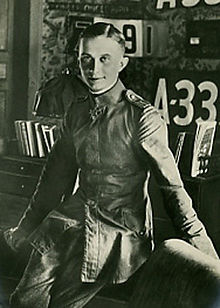Kurt Wolff | |
|---|---|
 Note the war souvenirs in the background. | |
| Nickname(s) | delicate little flower |
| Born | 6 February 1895 Greifswald, Pomerania |
| Died | 15 September 1917 (aged 22) near Moorslede, Belgium |
| Allegiance | |
| Service | Luftstreitkräfte |
| Years of service | 1912–1917 |
| Rank | Oberleutnant |
| Unit | Kampfstaffel 26 (Bomber Squadron 26); Kampfgeschwader 7 (Combat Squadron 7); Kampfgeschwader 40 (Combat Squadron 40); Royal Prussian Jagdstaffel 11 (Hunting Team 11) |
| Commands | Royal Prussian Jagdstaffel 29 (Hunting Team 29) Royal Prussian Jagdstaffel 11 (Hunting Team 11) |
| Awards | Prussian: Pour le Mérite House Order of Hohenzollern Iron Cross Bavarian: Bavarian Military Merit Order, 4th Class with Swords Iron Cross, both second and first class |
Oberleutnant Kurt Robert Wilhelm Wolff PlM (6 February 1895 – 15 September 1917) was one of Imperial Germany's highest-scoring fighter aces during World War I. The frail youthful orphan originally piloted bombers before being picked by Manfred von Richthofen to join Jagdstaffel 11 (Fighter Squadron 11) in the burgeoning Imperial German Air Service. Under the tutelage of Richthofen, Wolff would shoot down 33 enemy aircraft in four months, including 22 victims during the Royal Flying Corps' disastrous Bloody April, 1917. Wolff scored victories so rapidly he outran the Prussian awards system; although the Pour le Merite was customarily awarded after a fighter ace's 20th victory, Wolff's was not received until after his 29th.
On 6 May 1917, after this 29th victory, Wolff was transferred to command Jagdstaffel 29 and score two victories. When Richthofen moved up from Jagdstaffel 11 to become the wing commander of the Flying Circus, his replacement as Jagdstaffel 11 commander was killed. Wolff was transferred to command his old squadron; he scored his 32nd and 33rd victories with them. On 11 July, he was wounded and grounded after a crash landing. On 12 September 1917, the day after he returned to duty, he was promoted to Oberleutnant. Three days later, Wolff made his final patrol, leading a patrol of five in a prototype Fokker Triplane. In a chaotic dogfight with Sopwith Camels from No. 10 Naval Squadron, Wolff nearly collided with his assailant, Norman MacGregor. As Wolff fell out of sight, MacGregor claimed an "out of control" victory. Wolff was probably dead before the triplane's explosive impact.